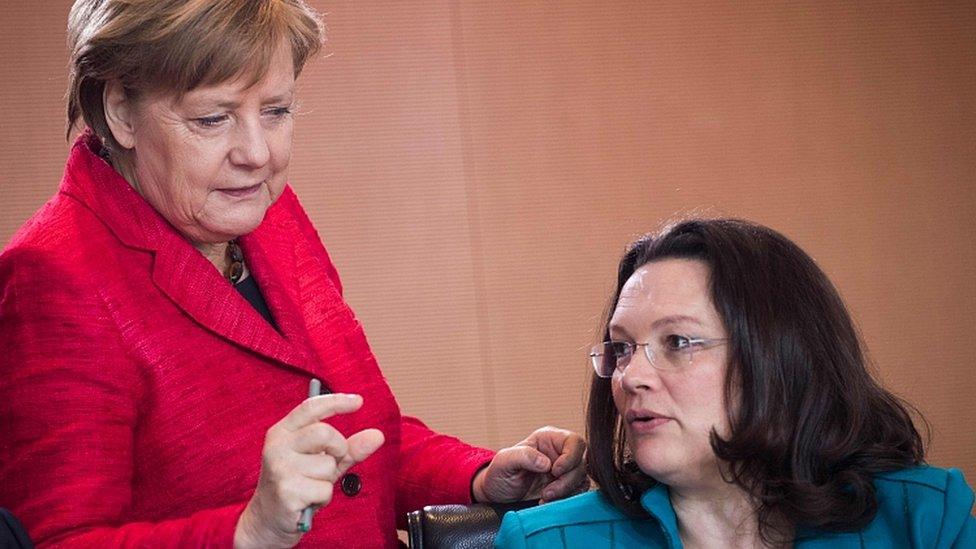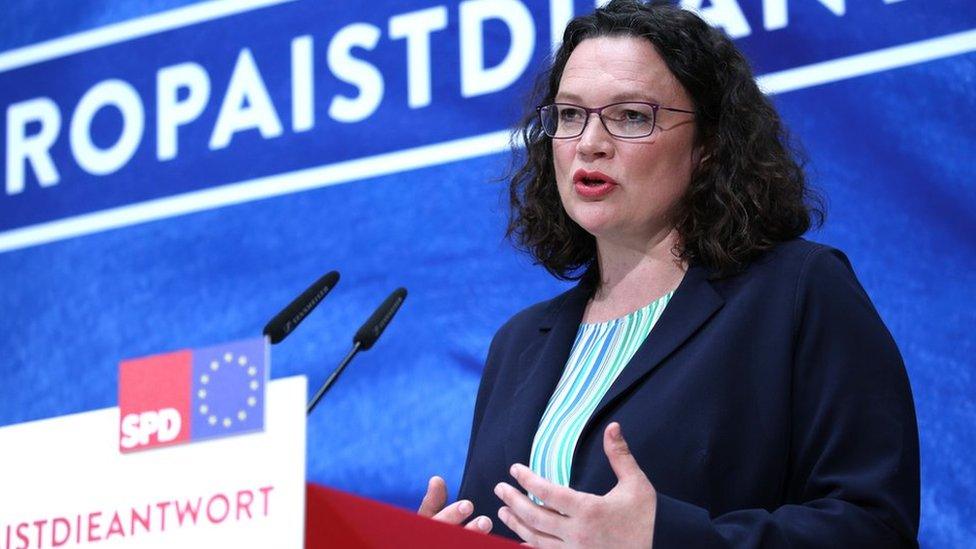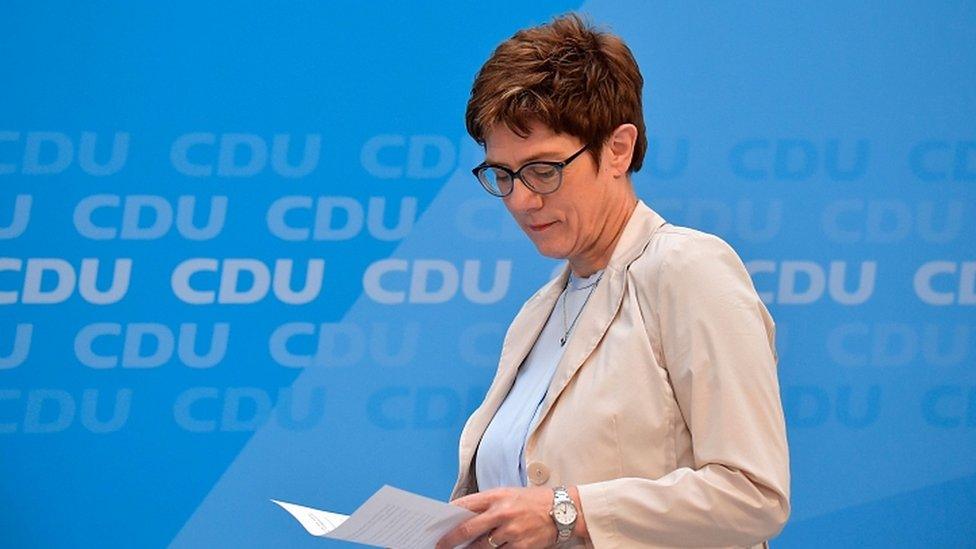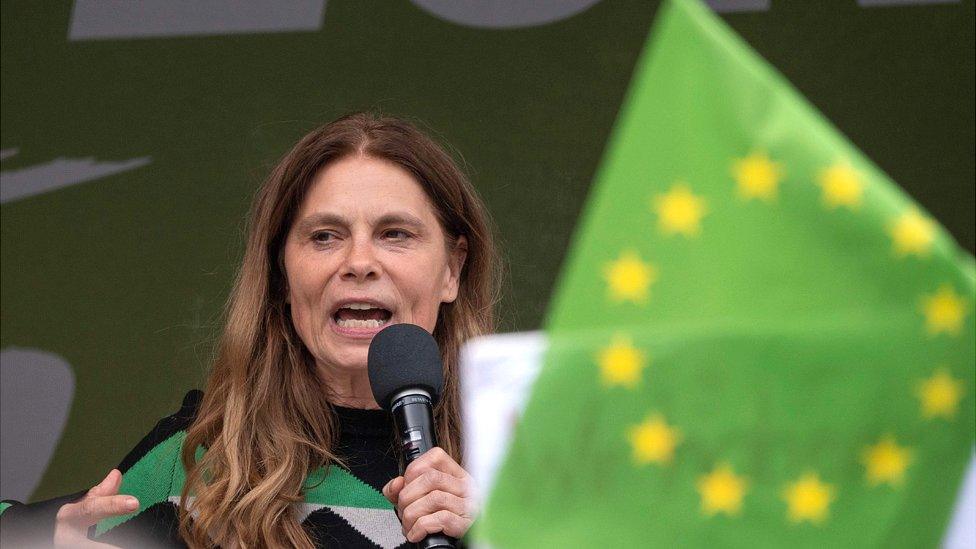Germany's Merkel vows to carry on despite coalition setback
- Published

Angela Merkel said she respected Andrea Nahles's decision to step down
German Chancellor Angela Merkel says her coalition government will continue despite the surprise resignation of the leader of its junior partner, the Social Democratic Party (SPD).
Mrs Merkel said she respected the "far-reaching" decision by Andrea Nahles.
Ms Nahles resigned after her centre-left party came third, behind Mrs Merkel's Christian Democrats (CDU) and the Greens, in the European elections.
She had been criticised by the SPD's left for remaining in the coalition.
Ms Nahles became SPD leader in April 2018, replacing Martin Schulz who also resigned following the party's poor performance in elections. She was expected to run for the position again and her resignation took analysts by surprise.
The coalition between the CDU and the SPD is due to last until federal elections in 2021, but correspondents say Ms Nahles's resignation could lead to the SPD leaving, triggering a snap poll.
Three key moments from Angela Merkel's career
Mrs Merkel herself plans to step down as chancellor in 2021, having already resigned as CDU leader at the end of last year.
What did Angela Merkel say?
"Andrea Nahles has made a far-reaching decision both for herself personally as well as for the Social Democratic Party of Germany," Mrs Merkel told reporters on Sunday.
"I would like to say on behalf of the government, we will continue the government's work with all seriousness. We will above all do it with a great sense of responsibility."

Andrea Nahles's SPD suffered heavy losses in last week's European elections
Ms Nahles said she would stand down as party leader on Monday and as head of its parliamentary group on Tuesday.
In a statement by the SPD on Sunday she said: "The discussions within the parliamentary faction and feedback from within the party have shown me that I no longer have the necessary support to carry out my duties."
She had earlier announced that the leadership contest would take place on Tuesday.
In last week's European Union parliamentary elections, her party hit an all-time low, getting less than 16% of the vote.
And on Saturday, an opinion poll showed that support for the SPD was the lowest it had ever been, at just 12%. At the same time, the Greens were shown to have overtaken the CDU as Germany's most popular party for the first time.
Where does this leave the coalition?
If the SPD were to leave the coalition, the fall of the government would be likely to trigger fresh elections.
But the left wing of the SPD has been urging the party to pull out since it entered into government last year. They say that compromising with conservatives has been costing them support.
The SPD's Olaf Scholz, who is also Germany's vice-chancellor, told the Tagesspiegel newspaper that he has ruled out entering another such coalition.
"Three grand coalitions in a row would not do democracy in Germany any good," he said in the interview before Ms Nahles announced her resignation.

CDU leader Annegret Kramp-Karrenbauer urged the SPD to support the coalition
On Sunday, Mrs Merkel's successor as CDU leader, Annegret Kramp-Karrenbauer, warned the SPD not to endanger the coalition.
"I assume the SPD will undergo a succession in short order without hindrance to the functioning of the grand coalition," she said.
"In the CDU we believe that this is not the time to play politics. We want to serve our country with good governing policies."
The latest crisis come days after Mrs Merkel dismissed reports of a rift with Mrs Kramp-Karrenbauer.
Two unidentified officials quoted in a Bloomberg article had said Mrs Merkel believed her successor was not up to the job. But the German chancellor dismissed the claims as nonsense.
- Published27 May 2019
- Published19 May 2019
